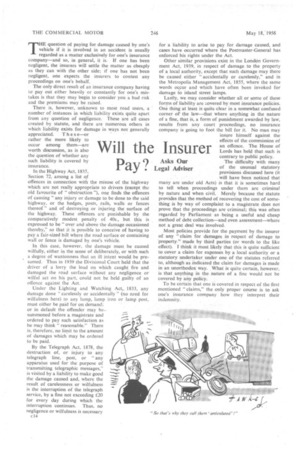T HE question of paying for damage caused by one's vehicle
Page 54

If you've noticed an error in this article please click here to report it so we can fix it.
if it is involved in an accident is usually regarded as a matter exclusively for one's insurance company—and so, in general, it is. If one has been negligent, the insurers will settle the matter as cheaply as they can with the other side; if one has not been negligent, one expects the insurers to contest any proceedings on one's behalf.
The only direct result of an insurance company having topay out either heavily or constantly for one's mistakes is that they may begin to consider you a bad risk and the premiums may be raised.
There is, however, unknown to most road users, a number of instances in which liability exists quite apart from any question of negligence. These are all cases created by statute, and there are numerous others in which liability exists for damage in ways not generally appreciated. Thes e—or rather the more likely to occur among them—are worth discussion, as is also the question of whether any such liability is covered by insurance.
In the Highway Act, 1835, Section 72, among a list of offences in connection with the misuse of the highway which are not really appropriate to drivers (except the old favourite of "obstruction "), one finds the offences of causing "any injury or damage to be done to the said highway, or the hedges, posts, rails, walls or fences thereof" and of destroying or injuring the surface of the highway. These offences are punishable by the comparatively modest penalty of 40s., but this is expressed to be "over and above the damage occasioned thereby," so that it is possible to conceive of having to pay a fair-sized bill where the road surface or containing wall or fence is damaged by one's vehicle.
In this case, however, the damage must be caused wilfully, either in the sense of deliberately, or with such a degree of wantonness that an ill intent would be presumed. Thus in 1939 the Divisional Court held that the driver of a lorry the load on which caught fire and damaged the road surface without any negligence or wilful act on his part, could not be held guilty of an offence against fhe Act.
Under the Lighting and Watching Act,. 1833, any damage done "carelessly or accidentally" (no need for wilfulness here) to any lamp, lamp iron or lamp post, must either be paid for on demand; or in default the offender may be— summoned before a magistrate and ordered to pay such satisfaction as
he may think "reasonable." There is, therefore, no limit to the amount of damages which may be ordered to be paid.
By the Telegraph Act, 1878, the destruction of, or injury to any telegraph line, post, or "any apparatus used for the purpose of transmitting telegraphic messages," is visited by a liability to make good the damage caused and, where the result of carelessness or wilfulness is the interruption of the telegraph service, by a fine not exceeding £20 for every day during which the interruption continues. Thus, no negligence or wilfulness is necessary c t 4
Will the Pay?
for a liability to arise to pay for damage caused, and cases have occurred where the Postmaster-General has enforced his rights under the Act.
Other similar provisions exist in the London Government Act, 1939, in respect of damage to the property of a local authority, except that such damage may there be caused either "accidentally or carelessly," and in the Metropolis Management Act, 1855, where the same words occur and which have often been invoked for damage to island street lamps.
Lastly, we may consider whether all or some of these forms of liability are covered by most insurance policies. One thing at least is quite clear in a somewhat confused corner of the law—that where anything in the nature of a fine, that is, a form of punishment awarded by law, results from any court proceedings, no insurance company is going to foot the bill for it. No man may insure himself against the effects of the commission of an offence. The House of Lords has held that such is contrary to public policy.
Insurer
The difficulty with many of the unusual statutory provisions discussed here (it will have been noticed that many are under old Acts) is that it is sometimes hard to tell when proceedings under them are criminal by nature and when civil. Merely because the statute provides that the method of recovering the cost of something is by way of complaint to a magistrate does not prove that the proceedings are criminal; this was often regarded by Parliament as being a useful and cheap method of debt collection—and even assessment—where not a great deal was involved.
Most policies provide for the payment by the insurer of any "claim for damages in respect of damage to property" made by third parties (or words to the like effect). I think it most likely that this is quite sufficient to cover a claim for expenses by a local authority or a statutory undertaker under one of the statutes referred to, although as indicated the claim for damages is made in an unorthodox way. What is quite certain, however, is that anything in the nature of a fine would not be covered by any policy.
To be certain that one is covered in respect of the first mentioned "claims," the only proper course is to ask one's insurance company how they interpret their indemnity.
















































































































